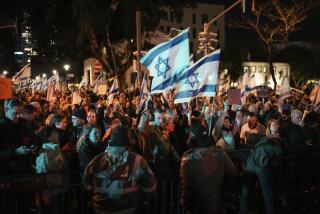Saudi Urges a Crackdown on Suicide Bombings
- Share via
CAIRO — As Israel massed military forces near the Gaza Strip, Saudi Arabia’s foreign minister said Friday that the Palestinian Authority must share the burden of ending the 19-month-old conflict by cracking down on militants responsible for targeting Israeli civilians with suicide bombings.
“Both sides must stop doing what they are doing in order for anything to happen,” Prince Saud al Faisal, the foreign minister, told Western journalists here in comments that mark a shift away from the Arab tendency to universally blame Israel for the wave of bloodshed. “For one side to stop alone and the other to be left to do anything he pleases is not going to do the job.”
Much of the Arab world is weary of warring between the Israelis and the Palestinians. The Saudis, Egyptians and Jordanians have been trying to find a formula that will bring it to an end. Officials in all three nations say they have pressed Palestinian Authority President Yasser Arafat to rein in radical Islamic groups responsible for suicide bombings.
Yet the foreign minister repeated a common belief among Arab leaders that if peace is to take hold, Israel must resist the urge to retaliate in the face of suicide attacks and the United States must push the Israelis to be patient.
The Palestinian Authority has been devastated by a recent Israeli military offensive in the West Bank, he said, and he argued that it must be given time to rebuild its security forces. Then, the Saudi said, he has no doubt it will act to crack down on militants.
“In the meantime there must be restraint on the part of Israelis,” Saud said.
Under pressure from Washington, Arafat publicly condemned suicide bombings after an attack Tuesday on a pool hall near Tel Aviv killed 15 Israelis, making his statement in Arabic, as demanded by the White House. He followed up with the arrest of 16 Hamas militants, though leaders of the group said the detainees were lower-level members.
Saudi Arabia’s de facto ruler, Crown Prince Abdullah, recently met with President Bush and is scheduled to brief Egyptian President Hosni Mubarak in Egypt today on that session. Syrian President Bashar Assad also is expected to attend. Though the discussion is aimed at trying to push forward the peace process, there is also concern over a possible Israeli attack on Gaza in response to Tuesday’s bombing.
Mubarak this week sent a letter to Bush asking him to help prevent an incursion, and another letter to Israeli Prime Minister Ariel Sharon warning that an attack so close to the Egyptian border would be fraught with danger.
Though the Saudis and Egyptians believe that the Bush administration is asking more of Arafat than the Palestinian leader can provide, the foreign minister emphasized that the kingdom is pleased with Washington’s recent efforts that helped free the Palestinian leader from house arrest in Ramallah and end the Israeli siege at the Church of the Nativity in Bethlehem. He said he hoped the same U.S. effort would be extended toward stopping an Israeli campaign in Gaza.
The foreign minister’s comments are part of a concerted effort to reposition Saudi Arabia in terms of public perception. After the Sept. 11 attacks, and news that 15 of the 19 hijackers were Saudi nationals, the kingdom’s strict form of religious government came under intense criticism from the West. Since then, the Saudis have tried to appear more moderate, a strategy that even some of their Arab friends argue is merely a calculated bid to improve relations with Washington.
Arab leaders meeting in Beirut on March 28 approved a Saudi peace plan that would have their nations recognize Israel in exchange for an Israeli withdrawal from territory seized during the 1967 Middle East War. But Israeli troops invaded Palestinian areas of the West Bank the following day in response to a suicide bombing.
More to Read
Sign up for Essential California
The most important California stories and recommendations in your inbox every morning.
You may occasionally receive promotional content from the Los Angeles Times.












